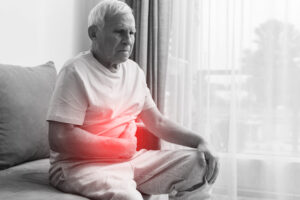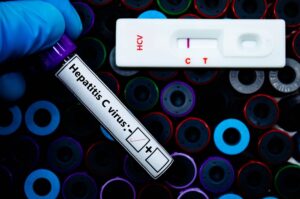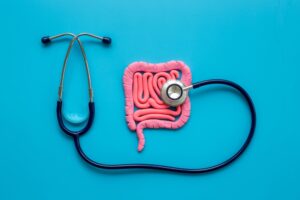
Signs of Stomach Ulcers
Stomach ulcers are open sores that develop on the lining of the stomach or small intestine, but heartburn is caused when stomach acid flows back into the esophagus.

Irritable bowel syndrome (IBS) is a chronic condition that affects the large intestine. It causes symptoms like abdominal pain, bloating, diarrhea, and constipation. The length of time that IBS lasts can vary from person to person.
IBS (Irritable Bowel Syndrome) flare-ups can vary significantly from one individual to another. Some people may experience symptoms lasting for a few days, while others may suffer for weeks or months. Factors such as stress, diet, and lifestyle can influence the duration and severity of an IBS flare-up.
It’s crucial to seek professional help to manage symptoms and improve quality of life. With proper treatment and management, it is possible to reduce the frequency and intensity of flare-ups.
One may experience symptoms associated with IBS, such as:
Remember, these symptoms can vary from person to person, and you should always consult with a healthcare professional if you’re experiencing persistent gastrointestinal discomfort.
IBS is a chronic condition that does not typically resolve on its own. While its symptoms may come and go, or decrease in severity over time, the underlying condition remains. Therefore, it’s essential to establish ongoing management strategies to control IBS symptoms.
Lifestyle changes such as maintaining a balanced diet, regular physical activity, and stress management can significantly improve symptoms. However, always consult a healthcare professional for a proper diagnosis and individualized treatment plan.
Irritable Bowel Syndrome (IBS) is a multifaceted condition influenced by various factors. Predominantly, the factors can be classified into three broad categories: food, stress, and hormones.
Certain foods and beverages can trigger IBS symptoms in some people. However, this can vary from person to person. Some common food triggers include:
Stress is a known trigger for IBS flare-ups. It doesn’t cause the condition, but it can exacerbate the symptoms. Below are some stress-related triggers that individuals with IBS should be aware of:
Hormonal fluctuations can also trigger IBS symptoms, particularly in women. Here are some hormone-related triggers that individuals with IBS should be aware of:
Remember, everyone’s reaction to hormone fluctuations can vary. If you suspect hormonal triggers are exacerbating your IBS symptoms, consult with a healthcare professional for personalized advice and treatment options.
Treating Irritable Bowel Syndrome (IBS) generally involves a comprehensive approach that includes diet and lifestyle adjustments, stress management, and medication. Dietary strategies often involve identifying and avoiding trigger foods, increasing fiber intake, and staying hydrated. Stress management techniques such as yoga, meditation, and cognitive-behavioral therapy can help manage the emotional aspects of IBS.
In terms of medication, depending on the individual’s symptoms, healthcare professionals might prescribe anti-diarrheals, laxatives, antispasmodics, or even certain antidepressants. It’s important to note that what works for one person might not work for another, so treatment strategies should be tailored to each individual’s unique needs. Regular follow-ups with a healthcare provider are crucial to monitor progress and make necessary adjustments to the treatment plan.
If you suspect you have Irritable Bowel Syndrome (IBS), or are experiencing symptoms that disrupt your daily life or persist for more than three days, it’s essential to seek medical advice. This includes but is not limited to, symptoms like persistent diarrhea or constipation, recurrent abdominal pain, dramatic changes in bowel habits, or unexplained weight loss accompanied by gastrointestinal symptoms.
Your doctor can help to determine the cause of these symptoms, provide a diagnosis, and guide you in crafting a personalized treatment plan. Remember, early intervention can significantly improve the management of IBS and enhance your quality of life. Contact an Allied Digestive Health provider today!

Stomach ulcers are open sores that develop on the lining of the stomach or small intestine, but heartburn is caused when stomach acid flows back into the esophagus.

Poorly absorbed carbs may ferment in the gut, leading to symptoms such as bloating, gas, diarrhea, or constipation.

If left untreated, GERD can lead to complications including esophagitis (inflammation of the esophagus), strictures (narrowing of the esophagus), or even Barrett’s esophagus, a condition that increases the risk of esophageal cancer.

IBS-C often requires a tailored approach that incorporates dietary changes, stress management, and sometimes prescribed medications to regulate bowel movements and reduce discomfort.

Hepatitis C can affect women differently due to hormonal variations, immune system responses, and unique physiological factors

This connection means that stress, anxiety, and other psychological factors can directly impact gut function, leading to symptoms like abdominal pain, bloating, and irregular bowel movements.

Chronic inflammation associated with IBD can lead to complications such as joint pain, skin conditions, eye issues, and more.

How different types of fiber affect IBS is crucial to creating a diet that supports digestive health without triggering flare-ups.

Lactose Intolerance occurs due to a deficiency of lactase, the enzyme responsible for digesting lactose in the small intestine.

This condition can result from various factors, including poor diet, stress, infections, or underlying health conditions like IBD.

One of the most essential steps in managing IBS is identifying specific triggers and paying attention to your body’s unique responses.

Although the symptoms of IBS can vary widely from person to person, several common signs are associated with the condition.
For Your Visit
Brick Office
P: 732-458-8300
Brick Medical Arts Building
1640 Route 88, Suite 202
Brick, New Jersey 08724
Mon – Fri: 8:30AM – 5:00PM
Sat & Sun: Closed
Neptune Office
P: 732-776-9300
Jersey Shore Medical Arts Building
1944 Corlies Ave. Suite 205
Neptune, New Jersey 07753
Mon – Fri: 8:30AM – 5:00PM
Sat & Sun: Closed
Jackson Office
P: 732-928-2300
706 Bennetts Mills Road
Jackson, New Jersey 08527
Mon – Fri: 8:30AM – 5:00PM
Sat & Sun: Closed
© All Rights Reserved